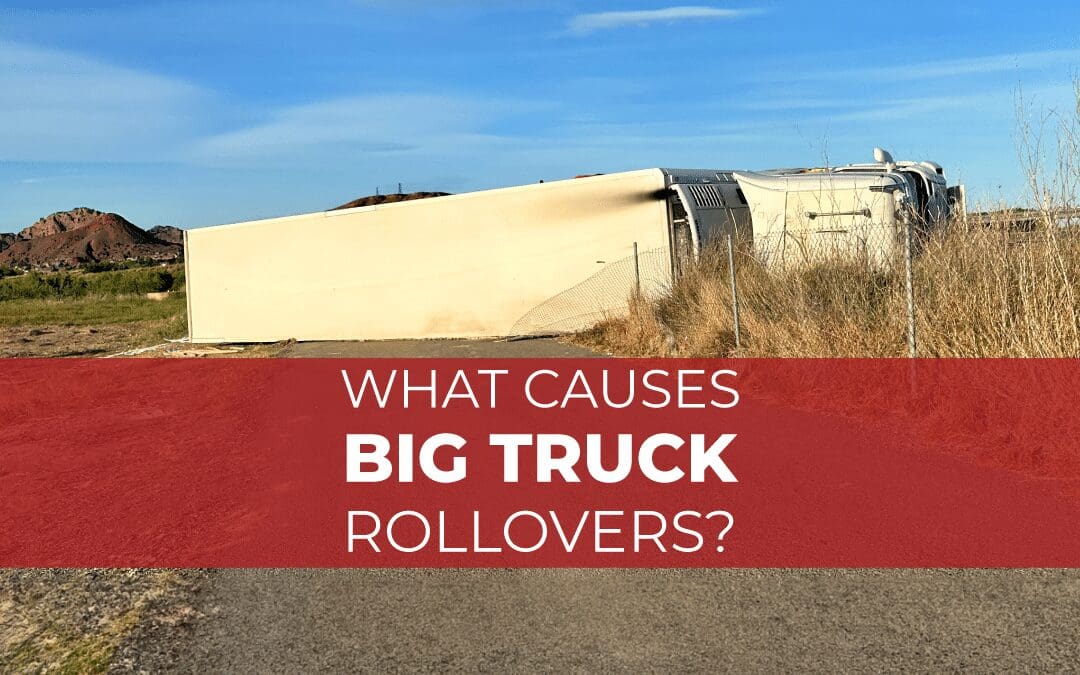What causes big truck rollovers?

Accidents involving big trucks (including semi-trucks, 18-wheelers, box and delivery trucks, or any large truck exceeding 10,000 pounds) injure and kill thousands on the road each year. A portion of those injuries are caused by big trucks rolling over and taking out whatever is in its path. A truck rollover can happen suddenly and cause mass destruction in a matter of moments. In this blog, we’ll discuss common causes of big truck rollover accidents and how an experienced truck accident lawyer can help if you’ve been hurt by someone else’s negligence.
What is a Big Truck Rollover?
Big truck rollovers can occur when a truck tries to stop or turn too quickly at an inappropriate speed, usually resulting in the front wheels changing direction quicker than the cargo it carries. This causes the vehicle to flip onto its side or roof while in motion. Since big trucks tend to have a high center of gravity due to how heavy they often are, they are prone to rollover accidents. Rollover wrecks can be particularly deadly due to the size and weight behind large trucks in comparison to typical passenger vehicles. A truck rollover can crush other smaller vehicles or send the truck careening into traffic, easily killing those in its path.
What Causes a Big Truck Rollover?
Although big truck wrecks can be caused by a variety of influences, they’re most commonly caused due to operator error, accounting for over 78% of rollover wrecks. That means many big truck wrecks, including rollover crashes, can likely be attributed to negligence, either by the driver, the trucking company, the manufacturer, or a combination of the three. While this statistic is staggering, it also provides hope for preventing future rollovers, since measures can be taken to avoid them. Although there are many people who can be held responsible for big truck rollovers, and many forms of operator error and negligence, there are a few examples that are more common than others.
Speeding
According to one study conducted by the Federal Motor Carrier Safety Administration, driving over the speed limit accounts for roughly 45% of big truck rollovers. Speeding trucks are deadly for several reasons. Since they can weigh upwards of 80,000 pounds, a big truck takes significantly longer to stop than a typical passenger vehicle. Their size alone makes them difficult to maneuver, and adding speed to the equation can spell disaster. As the truck becomes more difficult to control, it can tip, causing a rollover crash.
Curves
When a roadway curves, most vehicles have no issue navigating the change in direction. However, big trucks must approach curves with much more caution due to their size and the weight they are carrying. When a truck approaches a curve in a way that is unsafe, the momentum and shift in weight of its cargo can cause the trailer to tip over.
Improper Loading
Big trucks often carry cargo that can weigh tons – literally, thousands of pounds. Truck drivers must adjust their driving accordingly to ensure the vehicle doesn’t tip over. The more weight a truck has, the slower they should drive. Cargo carried by big trucks must be secured properly to avoid unwanted movement and prevent their cargo from coming loose on the road. If a semi-truck or box truck is loaded in a way that causes the trailer to shift, either by overloading or not balancing the cargo properly, the entire truck can roll. This often occurs on curves when cargo moves and causes weight distribution changes, as described above.
Lack of Attention
Operating a large truck requires significant focus. Truck drivers who are distracted by phones, passengers, or radios can cause deadly accidents. Truck drivers and trucking companies are also responsible for ensuring they get enough sleep between shifts to operate a vehicle safely. There are strict protocols placed on big truck drivers and companies that limit the hours they can drive in a single shift. When these safety measures are ignored and result in drowsy driving, a driver can quickly lose control of their rig. Additionally, an inattentive driver will often overcorrect or shift direction suddenly once they notice a hazard – such as stopped traffic ahead or an obstacle in the road – which can lead to a rollover.
Mechanical Failure
Mechanical failure rollovers are caused by a malfunction with the truck itself. This could include a tire blowout, brake failure, or the failure of any other part on the truck that causes a rollover. In this case, fault may lie with the truck driver for not maintaining their rig. The truck manufacturer or parts manufacturer may also be held responsible if the wreck was caused by a defect in the manufacturing process. Regardless of who is to blame, any malfunction on the road can cause catastrophic injuries for others surrounding the vehicle.
Ring the Bell! Call 898-Bell
Whether a crash is caused by reckless driving, shifting cargo, or a tire blowout, many big truck rollovers can be attributed to negligence by one or more parties. Big truck accidents in New Mexico often cause lifelong, devastating injuries. When you’re hurt, navigating the complexities of the legal world and insurance industry can be daunting. Big truck insurance companies know they risk losing thousands – sometimes millions – of dollars after their negligence harms someone else, and they often have teams of legal professionals in place to ensure you’re paid as little as possible. Don’t accept a lowball offer! The Ron Bell Injury Lawyers team is here to help. We’ve been helping injured victims in Albuquerque and throughout New Mexico for over 40 years. We know how to investigate big truck accidents, collect evidence, and fight to get you the most money possible for your injuries. If you’ve been hurt in a big truck wreck in Albuquerque, Ring the Bell! Call 898-Bell for a free, no obligation consultation with our legal team.
Why Choose Ron Bell Injury Lawyers?
We Get Results!
